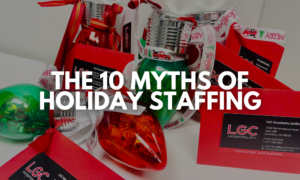Isn’t it ironic that an industry built around providing comfort and wellbeing for others is facing one of the largest mental health crises today?
In 2018, the tragic death of Anthony Bourdain – dubbed the ‘Culinary Hemingway’ by Forbes – shook the hospitality industry to its core. His suicide was a harsh reminder that, behind the fast-paced, customer-centered culture, the mental health of hospitality workers was being overlooked. In the wake of his death, many restaurants, hotels, and other businesses began examining their policies and communications surrounding mental health. In addition, nonprofits and support groups emerged to help break the stigma in an industry notorious for its demanding and relentless work environment.
But six years later, how far has the hospitality industry really come? Today, during National Suicide Awareness Month, we will explore the factors contributing to the ongoing mental health struggles of hospitality workers and outline how you, as an employer, can take actionable steps to ensure your employees feel supported and valued.
The Causes of Burnout and Mental Health Issues
Burnout and mental health issues in the hospitality industry are far from obsolete. Over 73% of restaurant employees are reported to be Gen Z, and adults aged 18-34 have the highest rates of mental health issues. So, what’s driving this high rate?
Post-COVID Staffing Shortages & Culture
The hospitality industry was hit hard by the pandemic, and staff shortages continue to place immense pressure on remaining workers. The hotel and restaurant industries are only just beginning to recover, but many still struggle with finding enough staff to not fall short. Thus employees have to fill the gaps, working extra hours in an already fast-paced, demanding environment.
Low Pay and Long Hours
The industry is notorious for low wages and extended shifts. Coupled with minimal breaks, this rigor leaves little room for personal recovery and balance. Since most positions aren’t salaried, employees often feel they have no choice but to show up – even when sick or injured – because they lack benefits like paid time off or health insurance.
Lack of Employer Support
Though 84% of operators acknowledge that their employees’ mental health is important, many workers still report that they don’t feel supported. The “work work work” mentality prioritizes productivity over wellbeing, creating a culture where workers are afraid to seek help, as it may interfere with their shifts. Which leads to being overworked and experiencing detrimental physical and mental symptoms.
As a central part of any community, the hospitality industry can only thrive when its workers are at their best. Hospitality is a field of passion full of people who love working alongside other people. But shockingly, 45% of hospitality employees wouldn’t recommend this career to others, and 74% have endured verbal abuse or negativity from customers.
Statistics from the Culinary Hospitality Outreach Wellness (CHOW) group paint an even bleaker picture:
- 63% of hospitality workers suffer from depression
- 84% feel stress from their jobs
- 65% report using substances while at work
It’s obvious that the mental health crisis is still ongoing. So, what is your role as an employer and how can you help?
What Can You Do to Support Your Workers?
You may already be aware of these challenges or even working towards making life easier for your employees. But are you doing enough?
Prioritize Work-Life Balance
One of the most prominent reasons employees leave their jobs is lack of work-life balance. So, creating a sustainable work environment requires giving your employees room to breathe. Start by scheduling shifts in advance so that workers can plan their lives accordingly. Your employees have kids, family members, and spouses that they have to take care of, not to mention how important it is to maintain an active social life.
Everyone needs a break sometimes. So, honor their time-off requests when possible, offer extra pay on holidays, and provide free meals during shifts to make their workdays more enjoyable.
Foster a Positive Work Environment
Employees who enjoy coming to work are more likely to stay and thrive. Organize social events, ensure shifts are shared to avoid overly long hours, and make flexible scheduling the norm. Additionally, train all managers to be empathetic and supportive leaders. Social support is proven to help immensely with healthy coping, but 46% of workers say they aren’t comfortable sharing mental health concerns with coworkers. Your staff should feel comfortable expressing their needs without fear of judgment, and that begins with their work environment.
Invest in Mental Health Training
Mental health training, such as that offered by The Burnt Chef Project, teaches employers how to recognize signs of burnout and support employees before it becomes a crisis. It may seem minimal, but being preventative instead of reactive will not only evade a crisis, but it will teach real skills to use outside of work as well. Equip your team with these skills to create an open dialogue around mental health and communicate that healthy living is a priority.
Provide Resources
There are several organizations that specialize in mental health support for hospitality workers in specific. Consider making these resources available to your staff:
- Ben’s Friends: A support group for those in the hospitality industry struggling with substance abuse.
- CHOW (Culinary Hospitality Outreach Wellness): Focuses on breaking the stigma around mental health in the culinary world.
- The Giving Kitchen: Offers emergency assistance to food service workers.
- NeedyMeds: Provides information on programs to help with medical costs.
Incorporating mental health resources into your workplace, such as virtual therapy or access to support groups, could be the first step toward alleviating the mental health burden your employees carry.
Conclusion: Why It Matters
COVID-19 may be in the past, but the mental health crisis in hospitality is far from over. Burnout can lead to serious consequences, including anxiety, depression, and substance abuse. Don’t just take our word for it – consider the stories of hospitality veterans like Lee Anne Wong, Kevin Morrison, and Michael Scribbner, who have shared personal struggles with mental health in their careers.
Addressing mental health isn’t just good for your employees – it’s good for your business. By cultivating a supportive environment, you’ll enjoy higher customer satisfaction, increased revenue, lower turnover, and greater employee loyalty.
The bottom line is many employees love their job, but their mental health is making it difficult to remember why. And it’s not just employees either. Everyone experiences stress and you may have experienced burnout, anxiety, or depression as someone in management. If you have, you can empathize with how exhausting it feels to cope with everyday life, not to mention dealing with the stressors of work.
Investing in you and your employees’ mental health and wellbeing isn’t just optional, it’s essential. The consequences are too great to not start now. Consider implementing regular sessions for mental health support or asking your employees where they could use some support. The little things matter and asking the question can go a long way. The mental health crisis doesn’t have to be forever if we all pitch in and work together to support each other.
September is National Suicide Awareness Month. If you or someone you know is having a mental health crisis, call 988.
In other news…
Have you followed our social media?
To download StaffNow, check out our Linktree!
About LGC
Since 2003 LGC has been building connections between businesses with staffing needs and job seekers looking for new opportunities. Our range of solutions includes temporary and permanent placements (and everything in between) for a variety of industries. With offices located nationwide, we can tap into a dynamic pool of talented professionals. We have a passion for creating partnerships that last and work hard every day to ensure both clients and candidates reach their employment goals.





